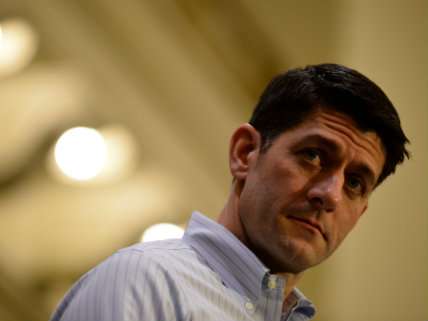The GOP's Obamacare Repeal Bill Has Finally United the Right On Health Care—Against the Bill
Conservative and libertarian activists and policy wonks have all expressed opposition to the House repeal plan.

At a health care conference in Florida earlier this month, John Boehner, the former Republican Speaker of the House, said he "started laughing" when he first heard about the GOP's plan to rapidly repeal and replace Obamacare.
"In the 25 years that I served in the United States Congress, Republicans never, ever, one time agreed on what a health care proposal should look like. Not once," Boehner said, in remarks first reported by Politico.
Boehner was, if anything, understating the party's internal disagreements. Not only did Republicans not agree about the legislative particulars, or even the basic policy mechanisms a bill should rely on, many had fundamental disagreements about what the role of the government in the nation's health care system should be.
The House GOP's Obamacare replacement bill, which was finally released to the public last night after months of delays and secrecy, was, maybe more than anything else, an attempt to build party unity where none existed. It followed President Trump's endorsement of tax credits to provide coverage, an endorsement that GOP Speaker of the House Paul Ryan had sought as a way of bringing the fractured right together, and it appeared designed to address some of the concerns that had been raised about leaked versions of the bill with regards to Medicaid and tax credits for wealthier individuals. The bill was an attempt to find—or create—common ground for conservatives who agreed on little except that Obamacare should go.
That effort appears to have worked, albeit not in the way party leadership intended. The right has united—in opposition to the bill.
Nearly all of the major conservative activist organizations have come out against the plan. Heritage Action, which led the Obamacare fight that resulted in the 2013 government shut down and which often functions as a sort of shadow whip operation for House Republicans, called the bill "bad politics" and "bad policy." FreedomWorks (where I once worked) called it "Obamacare-lite," and Freedom Partners Chamber of Commerce said that "As the bill stands today, it is Obamacare 2.0." The Club for Growth dubbed it RyanCare and labeled it a "warmed-over substitute for government-run health care." All of these organizations have been deeply opposed to Obamacare from the beginning—yet none of them support the bill that GOP leadership has dubbed repeal.
It's not just the activist groups who have come out against it. Influential conservative and libertarian health policy wonks and journalists from all over the spectrum have trashed the bill too: Michael Cannon, the health policy director for the libertarian Cato Institute, called the bill "a train wreck waiting to happen" and warned that it could destabilize insurance markets even more than Obamacare while paving the way for single payer. Avik Roy, an influential health policy wonk who has crafted one of the more interesting conservative health care reforms, was brutal in his assessment of the law's likely effects: "Expanding subsidies for high earners, and cutting health coverage off from the working poor: [the GOP bill] sounds like a left-wing caricature of mustache-twirling, top-hatted Republican fat cats." Philip Klein of The Washington Examiner lamented that the bill rests on the same philosophical underpinnings as Obamacare, and will ultimately change little: "The GOP," he wrote, "will either be passing legislation that rests on the same philosophical premise as Obamacare, or will pass nothing at all, and thus keep Obamacare itself in place."
Cannon, Roy, and Klein are all staunch critics of Obamacare, but they all have different approaches to repeal and reform. The bill doesn't satisfy any of them.
And of course GOP legislators like Sens. Rand Paul and Mike Lee have voiced clear opposition as well. When asked about whether he would support the bill, Sen. Ted Cruz was non-committal.
These are not exactly pro-Obamacare voices from within the Republican party, to say the least. And yet they are not coming out in support of the repeal bill.The attempt to craft a compromise that all or most of Obamacare's critics on the right could get behind has, for all practical purposes, failed entirely.
In many ways, Boehner was right: The GOP has never agreed on health care. It still doesn't. But the other problem is that the bill doesn't really accomplish any of the things that Republicans say they want to accomplish on health care, at least not well. It's likely to disrupt coverage for millions of people. The tax credit, which is really a subsidy, is designed in a way that tilts the advantage towards people who are better off. It is likely to spin the individual insurance market into a death spiral even faster than Obamacare. The Medicaid rollback doesn't take effect for years, and, given the politics, might never go into place.
Indeed, given the widespread criticism, it's unclear who, exactly, this bill was written for—except, perhaps, a GOP leadership that wanted to be able to say they had developed something they could label a repeal bill.
Even President Trump, whose endorsement of tax credits for coverage last week was viewed as a necessary stepping stone for rallying Republicans around the bill, offered only qualified support, tweeting this morning that "Our wonderful new Healthcare Bill is now out for review and negotiation." He added, "ObamaCare is a complete and total disaster—is imploding fast!" Based on the reactions so far, the House GOP's repeal bill may be following the same path.


Show Comments (43)